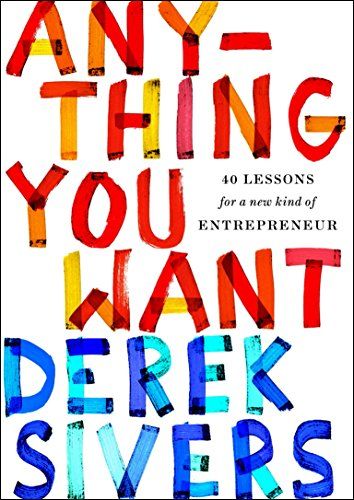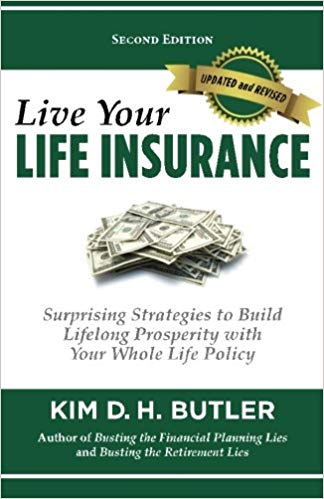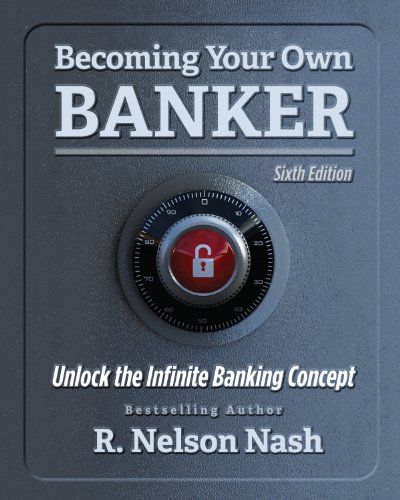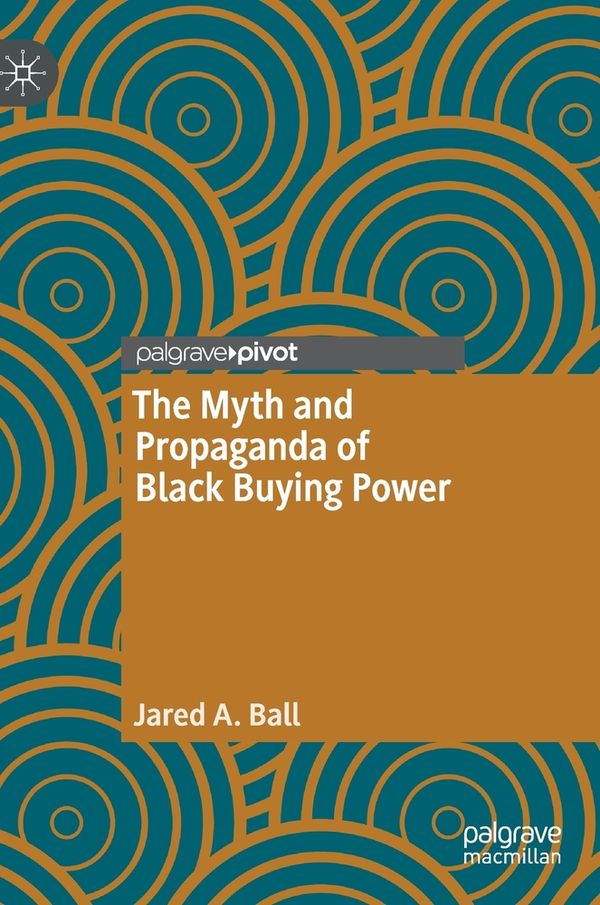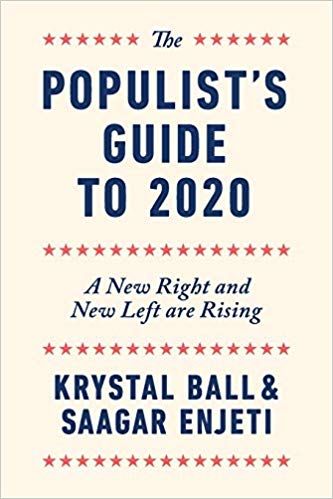Derek Sivers (2015)
Visit book's Bookshop Page for details and support local, independent book stores.
What's your compass?
Location 64: Most people don't know why they're doing what they're doing. They imitate others, go with the flow, and follow paths without making their own. They spend decades in pursuit of something that someone convinced them they should want, without realizing that it won't make them happy.
Location 67: You need to know your personal philosophy of what makes you happy and what's worth doing.
Location 70: Business is not about money. It's about making dreams come true for others and for yourself. Making a company is a great way to improve the world while improving yourself. When you make a company, you make a utopia. It's where you design your perfect world. Never do anything just for the money. Don't pursue business just for your own gain. Only answer the calls for help.
Location 74: Success comes from persistently improving and inventing, not from persistently promoting what's not working. Your business plan is moot. You don't know what people really want until you start doing it. Starting with no money is an advantage. You don't need money to start helping people. You can't please everyone, so proudly exclude people. Make yourself unnecessary to the running of your business. The real point of doing anything is to be happy, so do only what makes you happy.
Make a dream come true
Location 107: I wrote down my utopian dream-come-true distribution deal from my musician's point of view.
Location 115: I was just daydreaming about how one little thing would look in a perfect world. When you make a business, you get to make a little universe where you control all the laws. This is your utopia. When you make it a dream come true for yourself, it'll be a dream come true for someone else, too.
A business model with only two numbers
Location 127: A business plan should never take more than a few hours of work - hopefully no more than a few minutes. The best plans start simple. A quick glance and common sense should tell you if the numbers will work. The rest are details.
This ain't no revolution
Location 130: A revolution is a term that people use only when you're successful. Before that, you're just a quirky person who does things differently.
Location 135: When you're onto something great, it won't feel like revolution. It'll feel like uncommon sense.
If it's not a hit, switch
Location 142: Once you've got a hit, suddenly all the locked doors open wide. People love the hit so much that it seems to promote itself. Instead of trying to create demand, you're managing the huge demand.
Location 144: We've all heard about the importance of persistence. But I had misunderstood. Success comes from persistently improving and inventing, not from persistently doing what's not working. We all have lots of ideas, creations, and projects.
Location 146: When you present one to the world and it's not a hit, don't keep pushing it as is. Instead, get back to improving and inventing.
Location 147: Present each new idea or improvement to the world. If multiple people are saying, "Wow! Yes! I need this! I'd be happy to pay you to do this!" then you should probably do it. But if the response is anything less, don't pursue it. Don't waste years fighting uphill battles against locked doors. Improve or invent until you get that huge response.
No "yes." Either "Hell yeah!" or "no."
Location 151: If you're not saying, "Hell yeah!" about something, say no. When deciding whether to do something, if you feel anything less than "Wow! That would be amazing! Absolutely! Hell yeah!" then say no.
Location 153: When you say no to most things, you leave room in your life to throw yourself completely into that rare thing that makes you say, "Hell yeah!"
Location 154: For every event you get invited to, every request to start a new project, if you're not saying, "Hell yeah!" about it, say no.
Location 155: Saying yes to less is the way out.
Just like that, my plan completely changed
Location 162: He replied, "Oh, sorry; I thought it was a store." A store? Oh! Interesting. He thinks I'm a store! I hadn't thought of that. Maybe if I set it up like a store, I'd actually be doing my friends a bigger favor, by getting total strangers to buy their music, too. And just like that, my plan completely changed.
Location 164: Five years later, when the iTunes Music Store launched, Apple asked us to be a digital distributor. I hadn't thought of that. But I said OK. And just like that, my plan completely changed again.
Location 166: Anytime you think you know what your new business will be doing, remember this quote from serial entrepreneur Steve Blank: "No business plan survives first contact with customers."
Hmmmmmn! Interesting!! No business plan survives first contact with customers!
The advantage of no funding
Location 174: I'm so glad I didn't have investors. I didn't have to please anybody but my customers and myself. No effort was spent on anything but my customers. I'd get weekly calls from investment firms, wanting to invest in CD Baby. My immediate answer was always, "No thanks." They'd say, "Don't you want to expand?" I'd say, "No. I want my business to be smaller, not bigger." That always ended the conversation.
Location 179: Necessity is a great teacher.
Location 182: Never forget that absolutely everything you do is for your customers. Make every decision - even decisions about whether to expand the business, raise money, or promote someone - according to what's best for your customers. If you're ever unsure what to prioritize, just ask your customers the open-ended question, "How can I best help you now?" Then focus on satisfying those requests.
Location 185: None of your customers will ask you to turn your attention to expanding. They want you to keep your attention focused on them.
Location 186: It's counterintuitive, but the way to grow your business is to focus entirely on your existing customers. Just thrill them, and they'll tell everyone.
Start now. No funding needed.
Location 188: Watch out when anyone (including you) says he wants to do something big, but can't until he raises money. It usually means the person is more in love with the idea of being big-big-big than with actually doing something useful. For an idea to get big-big-big, it has to be useful. And being useful doesn't need funding.
Location 190: If you want to be useful, you can always start now, with only 1 percent of what you have in your grand vision. It'll be a humble prototype version of your grand vision, but you'll be in the game.
Location 200: Starting small puts 100 percent of your energy into actually solving real problems for real people. It gives you a stronger foundation to grow from. It eliminates the friction of big infrastructure and gets right to the point. And it will let you change your plan in an instant, as you're working closely with those first customers telling you what they really need.
Ideas are just a multiplier of execution
Location 211 : Ideas are worth nothing unless they are executed. They are just a multiplier. Execution is worth millions. Explanation:
Awful idea = -1
Weak idea = 1
So-so idea = 5
Good idea = 10
Great idea = 15
Brilliant idea = 20
No execution = $1
Weak execution = $1,000
So-so execution = $10,000
Good execution = $100,000
Great execution = $1,000,000
Brilliant execution = $10,000,000
Location 224: To make a business, you need to multiply the two components.
Location 226: That's why I don't want to hear people's ideas. I'm not interested until I see their execution.
Formalities play on fear. Bravely refuse.
Location 233: Do you passionately love the "Terms & Conditions" and "Privacy Policy" pages on other websites? Have you even read them? If not, then why would you go putting that garbage on your website? After CD Baby grew to fifty employees, all the business-to-business service companies started pitching me on how I needed an official employee review plan, sensitivity training, Terms and Conditions postings, and all this corporate crap. I got such joy out of saying no to all of it.
Location 238: As your business grows, don't let the leeches sucker you into all that stuff they pretend you need. They'll play on your fears, saying that you need this stuff to protect yourself against lawsuits. They'll scare you with horrible worst-case scenarios. But those are just sales tactics. You don't need any of it.
The strength of many little customers
Location 244: You have to custom-tailor your product to please a very few specific people. Those people might change their minds or leave the company. Whom are you really working for? Are you self-employed or is this client your boss? If you do land the big client, that organization will practically own you. By trying so hard to please the big client, you will lose touch with what the rest of the world wants.
Location 248: Instead, imagine that you have designed your business to have no big clients, just lots of little clients.
Location 249: You don't need to change what you do to please one client; you need to please only the majority (or yourself). If one client needs to leave, it's OK; you can sincerely wish her well. Because no one client can demand that you do what he says, you are your own boss (as long as you keep your clients happy in general). You hear hundreds of people's opinions and stay in touch with what the majority of your clients want.
Location 255: When you build your business on serving thousands of customers, not dozens, you don't have to worry about any one customer leaving or making special demands. If most of your customers love what you do, but one doesn't, you can just say good-bye and wish him the best, with no hard feelings.
Proudly exclude people
Location 258: You know you can't please everyone, right?
Location 259: You need to confidently exclude people, and proudly say what you're not. By doing so, you will win the hearts of the people you want.
Location 268: It's a big world. You can loudly leave out 99 percent of it. Have the confidence to know that when your target 1 percent hears you excluding the other 99 percent, the people in that 1 percent will come to you because you've shown how much you value them.
Why no advertising?
Location 275: This goes back to the utopian perfect-world ideal of why we're doing what we're doing in the first place.
This is just one of many options
Location 295: You can't pretend there's only one way to do it. Your first idea is just one of many options. No business goes as planned, so make ten radically different plans. Same thing with your current path in life:
You don't need a plan or a vision
Location 312: So please don't think you need a huge vision. Just stay focused on helping people today.
"I miss the mob."
Location 326: Never forget why you're really doing what you're doing. Are you helping people? Are they happy? Are you happy? Are you profitable? Isn't that enough?
How do you grade yourself?
Location 330: We all grade ourselves by different measures: For some people, it's as simple as how much money they make. When their net worth is going up, they know they're doing well. For others, it's how much money they give. For some, it's how many people's lives they can influence for the better. For others, it's how deeply they can influence just a few people's lives.
Location 335: If I create something that's not useful to others, it doesn't count.
Location 337: How do you grade yourself? It's important to know in advance, to make sure you're staying focused on what's honestly important to you, instead of doing what others think you should.
Care about your customers more than about yourself
Location 339: At a conference in Los Angeles, someone in the audience asked me, "What if every musician just set up their own store on their own website? Since that'd be the death of CD Baby, how do you plan to stop that?" I said, "Honestly, I don't care about CD Baby. I only care about the musicians. If someday, musicians don't need CD Baby anymore, that's great! I'll just shut it down and get back to making music."
Location 345: But even well-meaning companies accidentally get trapped in survival mode. A business is started to solve a problem. But if the problem were truly solved, that business would no longer be needed! So the business accidentally or unconsciously keeps the problem around so that they can keep solving it for a fee. (I don't want to pick on anyone's favorite pharmaceutical company or online productivity subscription tools, so let's just say that any business that's in business to sell you a cure is motivated not to focus on prevention.)
Your company should be willing to die for your customers. That's the Tao of business: Care about your customers more than about yourself, and you'll do well.
Act like you don't need the money
Location 352: Banks love to lend money to those who don't need it. Record labels love to sign musicians who don't need their help. People fall in love with people who won't give them the time of day. It's a strange law of human behavior. It's pretty universal.
Location 354: If you set up your business like you don't need the money, people are happier to pay you. When someone's doing something for the money, people can sense it, like they sense a desperate lover. It's a turnoff. When someone's doing something for love, being generous instead of stingy, trusting instead of fearful, it triggers this law: We want to give to those who give.
It's another Tao of business: Set up your business like you don't need the money, and it'll likely come your way.
Don't punish everyone for one person's mistake
Location 369: As a business owner, when you get screwed over by someone, you might be tempted to make a big grand policy that you think will prevent your ever getting screwed over again:
Location 372: It's important to resist that simplistic, angry, reactionary urge to punish everyone, and step back to look at the big picture.
Location 375: When one customer wrongs you, remember the hundred thousand who did not. You're lucky to own your own business. Life is good. You can't prevent bad things from happening. Learn to shrug. Resist the urge to punish everyone for one person's mistake.
The most successful e-mail I ever wrote
Location 411: When you make a business, you're making a little world where you control the laws. It doesn't matter how things are done everywhere else. In your little world, you can make it like it should be.
Location 415: After a few months, that felt really incongruent with my mission to make people smile. I knew I could do better. So I took twenty minutes and wrote this goofy little thing:
Your CD has been gently taken from our CD Baby shelves with sterilized contamination-free gloves and placed onto a satin pillow.
A team of 50 employees inspected your CD and polished it to make sure it was in the best possible condition before mailing.
Our packing specialist from Japan lit a candle and a hush fell over the crowd as he put your CD into the finest gold-lined box that money can buy.
We all had a wonderful celebration afterwards and the whole party marched down the street to the post office where the entire town of Portland waved "Bon Voyage!" to your package, on its way to you, in our private CD Baby jet on this day, Friday, June 6th.
I hope you had a wonderful time shopping at CD Baby. We sure did.
Your picture is on our wall as "Customer of the Year."
We're all exhausted but can't wait for you to come back to CDBABY.COM!!
Location 427: That one goofy e-mail created thousands of new customers. When you're thinking of how to make your business bigger, it's tempting to try to think all the big thoughts and come up with world-changing massive-action plans. But please know that it's often the tiny details that really thrill people enough to make them tell all their friends about you.
Little things make all the difference
Location 430: If you find even the smallest way to make people smile, they'll remember you more for that smile than for all your other fancy business-model stuff.
Location 435: We answered our phone within two rings, and someone actually picking up the phone at a company is so rare that musicians would often tell me later at conferences that it was the main reason they decided to go with CD Baby - they could always talk to a real person immediately.
Location 441: Every outgoing e-mail has a "From:" name, right? Why not use that to make people smile, too? With one line of code, I made it so that every outgoing e-mail customized the "From:" field to be "CD Baby loves [first name]." So if the customer's name was Susan, every e-mail she got from us would say it was from "CD Baby loves Susan." Customers loved this!
Location 456: See the customer tell the story himself in this great video: http://sivers.org/squid.
Location 457: Even if you want to be big someday, remember that you never need to act like a big boring company. Over ten years, it seemed like every time someone raved about how much he loved CD Baby, it was because of one of these little fun human touches.
It's OK to be casual
Location 462: He thought was that it's almost impossible to tell what someone's going to be like on the job until he's actually on the job for a few weeks. So I'd hire lightly and fire lightly.
Location 465: But I also took this same casual approach when I needed an important high-tech systems administrator: "Anyone have a friend who's good with Linux? Yeah? Is he cool? OK, tell him to start tomorrow."
Location 468: Don't try to impress an invisible jury of MBA professors. It's OK to be casual.
Naive quitting
Location 473: Since I had never quit a job before and didn't know how, I did what seemed to be the respectful and considerate thing to do: I found and trained my replacement. (It wasn't my boss's fault I wanted to quit, so why should I make it his problem? If I want to quit, it's my problem.) I called on my old friend Nikki, who I knew would be perfect, and offered her my job at my current salary. She came with me to the office for a week while I trained her in every aspect of the job. Once she had it mastered, I went into my boss's office on a Friday afternoon and said, "I need to quit now, but I've already trained my replacement. She's great. She'll take over for me starting Monday." My boss just looked a little stunned, then said, "Uh. Well. OK. We'll miss you. Tell her to see HR about the paperwork." And that was that.
Location 479: An employee told me he needed to quit. I said, "Drag. Well. OK. I wish you the best! Who's your replacement?" He looked confused. I said, "Have you found and trained a replacement yet?" He looked a little stunned, then said, "No . . . . I think that's your job." Now I was stunned. I asked a few friends and found out he was right. People can just quit a job without finding and training their replacements. I had no idea. All these years, I just assumed what I had done was normal. There's a benefit to being naive about the norms of the world - deciding from scratch what seems like the right thing to do, instead of just doing what others do.
Prepare to double
Location 490: But no matter what business you're in, it's good to prepare for what would happen if business doubled. Have ten clients now? How would it look if you had twenty at once? Serving eighty customers for lunch each day? What would happen if 160 showed up?
Location 492: Notice that "more of the same" is never the answer. You'd have to do things in a new way to handle twice as much business. Processes would have to be streamlined.
Location 493: Never be the typical tragic small business that gets frazzled and freaked out when business is doing well. It sends a repulsive "I can't handle this!" message to everyone. Instead, if your internal processes are always designed to handle twice your existing load, it sends an attractive "come on in, we've got plenty of room" message.
It's about being, not having
Location 524: When you want to learn how to do something yourself, most people won't understand. They'll assume the only reason we do anything is to get it done, and doing it yourself is not the most efficient way. But that's forgetting about the joy of learning and doing. Yes, it may take longer. Yes, it may be inefficient. Yes, it may even cost you millions of dollars in lost opportunities because your business is growing slower because you're insisting on doing something yourself. But the whole point of doing anything is because it makes you happy! That's it!
Location 529: In the end, it's about what you want to be, not what you want to have.
Location 530: To have something (a finished recording, a business, or millions of dollars) is the means, not the end. To be something (a good singer, a skilled entrepreneur, or just plain happy) is the real point.
Location 531: When you sign up to run a marathon, you don't want a taxi to take you to the finish line.
The day Steve Jobs dissed me in a keynote
Location 575: I had been offering excellent service. I could make promises and keep them because I was in full control. Now, for the first time, I had promised something that was out of my control. So it was time to do the right thing, no matter how much it hurt. I decided to refund everybody's $40, with my deepest apologies. With five thousand musicians signed up, that meant I was refunding $200,000. Since we couldn't promise anything, I couldn't charge money in good conscience.
Location 583: But I never again promised a customer that I could do something that was beyond my full control.
My $3.3 million mistake
Location 605: It was my fault for not reading what I signed. My fault for letting a bank teller's quick advice make that major decision for my business structure.
Location 608: In the end, I had to pay $3.3 million to buy back that 90 percent of my company.
Delegate or die: The self-employment trap
Location 609: Most self-employed people get caught in the delegation trap. You're so busy, doing everything yourself. You know you need help, but to find and train someone would take more time than you have. So you keep working harder, until you break.
Location 620: After a long night of thinking and writing, I got myself into the delegation mind-set. I had to make myself unnecessary to the running of my company.
Location 623: This time, instead of just answering the question, I called everyone together for a minute. I repeated the situation and the question. I answered the question, but more important, I explained the thought process and philosophy behind my answer.
Location 627: Everyone always remember that helping musicians is our first goal, and profit is second. You have my full permission to use that guideline to make these decisions yourself in the future. Do what makes the musicians happiest. Make sure everyone who deals with us leaves with a smile."
Location 629: I asked around to make sure everyone understood the answer. I asked one person to start a manual, and write down the answer to this one situation, along with the philosophy behind it. Then everyone went back to work. Ten minutes later, a new question. Same process:Gather everybody around. Answer the question and explain the philosophy. Make sure everyone understands the thought process. Ask one person to write it in the manual. et everybody know they can decide this without me next time.
Location 635: After two months of this, there were no more questions. Then I showed someone how to do the last of the stuff that was still my job. As part of learning it, he had to document it in the manual, and then show it to someone else, too. (Learn by teaching.) Now I was totally unnecessary. I started working at home, not going into the office at all. I had even taught the employees my thought process and philosophy about hiring new people. So our two newest employees were found, interviewed, hired, and trained by other employees. They used that manual to make sure all new employees understood the philosophy and history of CD Baby, and knew how to make decisions for themselves.
Location 640: I'd call in once a week to make sure everything was OK. It was. No one had any questions for me.
Location 641: Because my team was running the business, I was free to actually improve the business!
Location 642: I was still working twelve-hour days, but now I was spending all my time on improvements, optimizations, and innovations. To me, this was the fun stuff. This was play, not work.
Location 643: While I was away, my company grew from $1 million to $20 million in four years, and from eight to eighty-five employees.
Location 644: There's a big difference between being self-employed and being a business owner. Being self-employed feels like freedom until you realize that if you take time off, your business crumbles.
Location 646: To be a true business owner, make it so that you could leave for a year, and when you came back, your business would be doing better than when you left.
Make it anything you want
Location 648: After your business has been up and running awhile, you'll hit an interesting crossroads.
Location 651: Never forget that you can make your role anything you want it to be. Anything you hate to do, someone else loves. So find that person and let her do it.
Location 654: If you do this, you'll encounter a lot of pushback and misunderstanding, but who cares? You can't live someone else's expectation of a traditional business. You have to just do whatever you love the most, or you'll lose interest in the whole thing.
Location 658: Happiness is the real reason you're doing anything, right? Even if you say it's for the money, the money is just a means to happiness, isn't it?
Location 666: No. Make sure you know what makes you happy, and don't forget it.
Trust, but verify
Location 685: I learned a hard lesson in hindsight: Trust, but verify. Remember it when delegating. You have to do both.
Delegate, but don't abdicate
Location 687: Delegation doesn't come naturally to any of us.
Location 706: I learned an important word: abdicate. To abdicate means to surrender or relinquish power or responsibility; this word is usually used when a king abdicates the throne or crown.
Location 708: Lesson learned too late: Delegate, but don't abdicate.
How I knew I was done
Location 721: I realized that the bigger learning and growing challenge for me was letting go, not staying on. Surprised by this, I asked Seth Godin's advice. All he said was, "If you care, sell." (I think his point was that my lack of enthusiastic vision was doing a disservice to my clients. It'd be better for everyone if I put the company in more motivated hands that could help them all grow.)
Location 729: I let two companies bid, and ended up choosing the one that bid lower but understood my clients better.
Location 733: I've been asked a few times by other entrepreneurs, "How do you know when it's time to sell?" My answer is, "You'll know."
Why I gave my company to charity
Location 737: When I decided to sell CD Baby, I already had enough. I live simply. I don't own a house, a car, or even a TV. The less I own, the happier I am. The lack of stuff gives me the priceless freedom to live anywhere anytime.
Location 743: Then, when Disc Makers bought CD Baby, they bought it not from me but from the trust, turning it into $22 million cash to benefit music education. It's not that I'm altruistic. I'm sacrificing nothing. I've just learned what makes me happy. And doing it this way made me the happiest.
Location 746: I get the deeper happiness of knowing that the lucky streak I've had in my life will benefit tons of people - not just me.
Location 749: But most of all, I get the constant priceless reminder that I have enough.
You make your perfect world
Location 752: Business is as creative as the fine arts. You can be as unconventional, unique, and quirky as you want. A business is a reflection of the creator.
Location 756: No matter which goal you choose, there will be lots of people telling you you're wrong.
Location 757: Just pay close attention to what excites you and what drains you. Pay close attention to when you're being the real you and when you're trying to impress an invisible jury.
Location 758: Even if what you're doing is slowing the growth of your business, if it makes you happy, that's OK. It's your choice to remain small.
Location 761: Whatever you make, it's your creation, so make it your personal dream come true.
